Is Grout Waterproof? It Depends on the Type!
Author: Omar Alonso | Editor: Omar Alonso
Review & Research: Jen Worst & Chris Miller
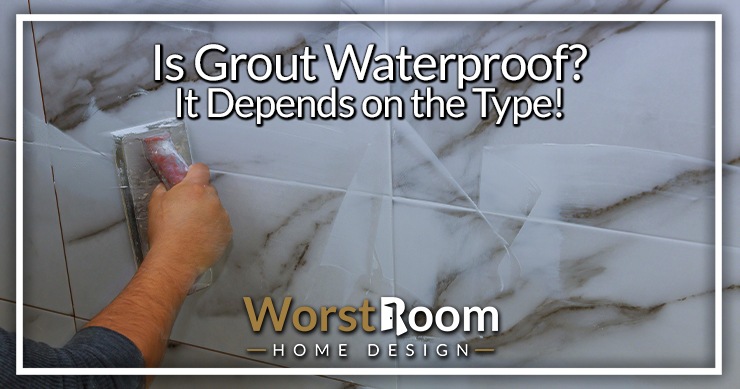
Is grout waterproof? This is a question most homeowners ask when looking for solutions to waterproof their bathrooms. Grout has different waterproofing capabilities depending on its type and whether you add sealant during installation.
What Type of Grout Is Waterproof?
Different types of grout have different waterproofing properties based on their components. Some are more capable of preventing water absorption, while others are highly porous.
Let’s examine the waterproof capabilities of each type of grout. Another way of asking this question is, "is grout porous?" and the answer is yes. And that needs to be dealt with before water comes into play.
Epoxy Grout
Epoxy grout is the only waterproof grout. It is the most durable and best choice for bathroom grout. It is highly resistant to water and stain but is also more expensive and requires more effort during installation, making it one of the hardest grout to apply.
Epoxy grout contains epoxy resins mixed with filler compounds. These epoxy resins give this grout type its water-resistant and stain-resistance properties. So, is grout waterproof? Only the epoxy kind, but there's a way to make any grout type waterproof that we'll discuss.
Acrylic Grout
Acrylic grout is a premixed grout with similar properties to epoxy grout. It consists of an acrylic resin, fillers, and pigment. The acrylic resin provides the water-resistant capabilities of this grout type.
While water-resistant, manufacturers recommend combining the grout with a water-based sealant in bathrooms and wet areas.
Cementitious Grout
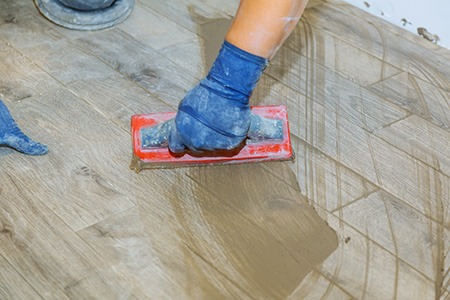
Cementitious grout is the most common grout type. It is made from Portland cement combined with filler particles. It can be sanded or un-sanded. Sanded cementitious grout is the most porous and must have a sealant to waterproof it. It consists of cement, fillers, sand, and pigment.
Sanded cementitious grout works best for grouting joints larger than an eighth of an inch due to its longevity and flexibility without cracking over time. This grout cures in about 72 hours, after which you must seal it for stain and water resistance.
Un-sanded cementitious grout lacks sand. Like sanded grout, it is highly porous, therefore, requires sealing once it cures. Due to the absence of sand in this grout type, it works best for smaller joints of less than ⅛” thickness.
An un-sanded grout is harder to install and cures in 72 hours. Seal it after it cures to make it water-resistant.
Can You Waterproof Bathroom Grout?
You can use a grout sealer to waterproof bathroom grout. Grout sealer prevents moisture, water, and other liquids from seeping through the grout and under the tile. It is a great measure to prevent mold and mildew issues in your bathroom.
A grout sealer is necessary for any types of tile and tile installation unless you use epoxy grout. In addition to sealing grout during the tile installation, you must reseal the grout regularly. Reseal the grout at least annually, but every six months is a better timeline to prevent mildew and mold issues.
Must You Waterproof Bathroom Grout?
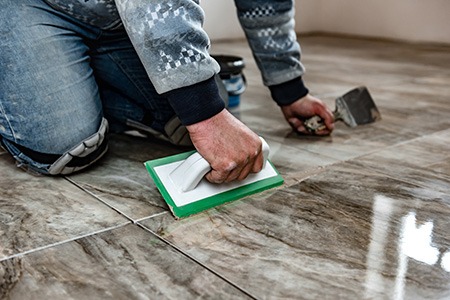
Is grout waterproof? is sanded grout waterproof? No and no, typically. It’s normal to have concerns about water issues such as mold and mildew, especially in moisture-prone areas such as bathrooms and showers. Waterproofing grout using a sealer is the best way to protect your floor from these water-related issues and is a must.
Without sealing the grout, you’re creating the perfect environment for dangerous mold and mildew, which could cause significant health issues to you and other people using the bathroom. Does sealing grout make it waterproof? Yes, it's how we've all managed to use tile in bathrooms and kitchen all this time.
In addition to these concerns, leaving grout unsealed allows water to seep between and under the tiles, which can cause significant damage to your floor. This is definitely a challenge if you don't know how to tile inside corners effectively.
What Does Grout Sealer Do?
Grout sealer forms a barrier on or in the grout, preventing moisture, water, or stains from getting to the grout. Since cement-based grout is porous, grout sealers work by filling these pores, preventing other materials from accumulating in the grout.
Without grout sealer, water, moisture, and stains would penetrate the grout causing issues like staining, bacterial accumulation, and mold development. In most cases, you must reapply grout sealer regularly, especially for high-traffic, moisture-heavy places like bathrooms.
Does un-sanded grout need to be sealed? I've heard this question many a time and yes, it does. It's neither waterproof before or after sanding without sealant (unless it's epoxy grout, in which case I would still add a sealant).
What Grout Sealer Should You Use?
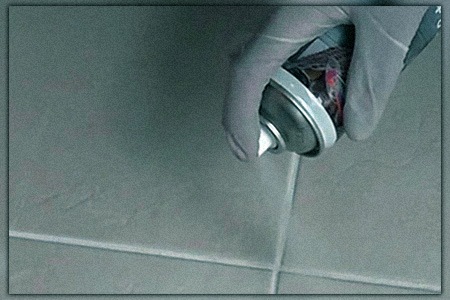
You can choose from two main grout sealers: membrane sealers and penetrating sealers, both used after the grout is in place. We'll discuss a third option, too, which is a sealant additive, that you mix into the grout before starting.
Penetrating grout sealers soak into the grout, changing its properties. Penetrating grout sealer comes as a liquid that works its way into the grout, creating a defense against water from the inside.
Due to its water-repelling qualities, it is suitable for bathrooms. It also has fewer maintenance requirements, meaning you don’t need to reseal the tile as often as you would with a membrane grout sealer.
Membrane grout sealer creates a protective layer that prevents water and moisture from penetrating the grout. This type of sealer works well in areas that experience heavy water usage, like bathrooms.
Membrane grout sealer consists of a synthetic polymer that forms a waterproof layer on the grout after drying. However, this protective film wears down with time. You must reapply it to maintain the waterproof quality of the bathroom floor.
These two types of grout sealers work after installing the tiles. However, there are grout additives you can use during the grout installation to serve as sealants.
Sealant additives are premixed liquid formulations used when mixing grout instead of water. Is grout waterproof? With this additive all types of grout can be. These additives ensure water-resistance properties are built into the grout, preventing water or moisture penetration.
Depending on the sealant additive, you might gain additional benefits, such as introducing flexibility into the grout for easier application, stronger grout, and color preservation. That said, you must ensure the sealant additive you choose is compatible with the grout you’re using.
How Do You Seal Bathroom Grout?
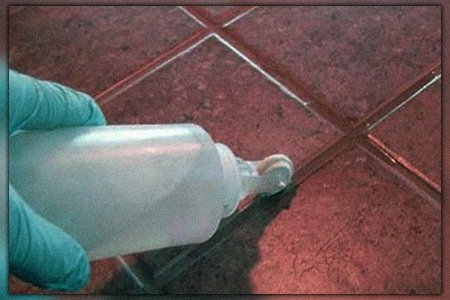
Applying grout sealer to grout helps waterproof it, thus preventing issues with mold or mildew growth. You can apply grout sealer at home to prevent water from seeping through them. During the application process, ensure you adhere to the instructions on the product label. Here are the steps to follow:
1) Choose the Right Sealer
Choose a suitable grout sealer based on the type of tiles and sealer quality. Pick a sealer that is compatible with your tiles and has a high tolerance to the high moisture contents of bathrooms.
2) Clean the Grout
If you’re sealing previously installed tiles, clean the grout to remove any dirt and staining. If you have freshly installed the tiles, ensure the grout is fully dry before applying grout sealers.
3) Apply Grout Sealer
Once you’ve cleaned the grout and allowed it to dry fully, apply the grout sealer throughout the floor. Ensure you’re working in a well-ventilated room.
Apply the grout throughout the floor, ensuring you don’t apply it on the tiles. Getting sealer on the floor can cause issues with hazy tiles and unnecessary costs trying to clean up the sealer.
Once you’ve applied sealer on the entire floor, leave the sealer to dry for two hours. Apply another layer of grout sealer to ensure you’ve covered the whole floor.
You can test whether the sealer will be effective by pouring water on the grout. If done well, the water won’t absorb into the grout. The grout sealer should last at least one year before it needs reapplication.
Do Tile & Grout Need Sealing?
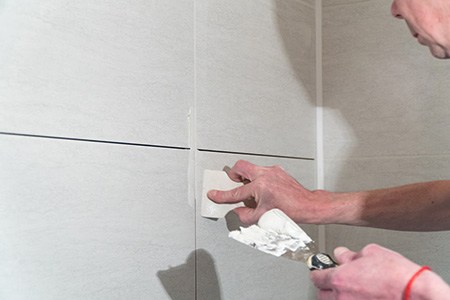
Since the answer to "is grout waterproof" pretty much a resounding no, you need sealant around water. Sealing grout protects tiled walls and floors, especially in moisture-prone areas like bathrooms. By sealing grout, you create a protective barrier between the grout and moisture or stains from the bathroom.
You'll even need it even if you use something like shower tile alternatives that still require grout. In addition to preventing water damage or mold and mildew growth, sealing grout prolongs its life and that of tiles or panels.
Some tiles, especially porcelain and ceramic tiles, don’t require sealing as they have non-porous surfaces. If you’re using natural stone tile, you must seal it due to its porous nature.
How Long Does Bathroom Grout Last?
Bathroom grout can last between 8-20 years, depending on the quality of the installation and maintenance. Poorly maintained/installed grout will last a shorter time.
Since the bathroom is prone to high moisture levels, choosing high-quality grout and sealing it as required can save you from wear issues such as cracking. Resealing the grout every six to twelve months should also help with the maintenance.
Despite the longevity or maintenance, some signs should alert you to the need for new grout installation. These signs include:
- Mold build-up
- Cracks in the grout
- Loose tiles
- Crumbling grout
When regrouting your bathroom, follow the correct procedures and use the right products for the best results.
So, Is Grout Waterproof?
Well, it depends on the type of grout and any sealing treatments done before or after installation. Epoxy grout is the only waterproof grout without any added sealing treatment. Other types of grout must have a sealant additive during installation or a sealant applied after the grout cures.
Without a sealant, moisture would penetrate the grout causing staining, bacterial accumulation, and mold development. So, is grout waterproof? Only epoxy grout, but any kind can become waterproof with sealant.



